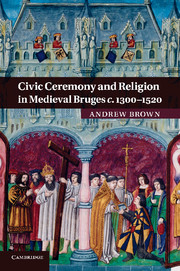Book contents
- Frontmatter
- Contents
- List of figures
- List of maps
- Acknowledgments
- List of abbreviations
- Note on currency and monies of account
- Introduction
- 1 The Holy Blood procession
- 2 General processions
- 3 Feast days and liturgical commemoration
- 4 Guilds: feast, festivity and public worship
- 5 Guilds and civic government
- 6 Civic charity
- 7 Civic ceremony, religion and the counts of Flanders
- Conclusion and epilogue: civic morality c. 1500
- Appendices
- Bibliography
- Index
- References
Conclusion and epilogue: civic morality c. 1500
Published online by Cambridge University Press: 03 May 2011
- Frontmatter
- Contents
- List of figures
- List of maps
- Acknowledgments
- List of abbreviations
- Note on currency and monies of account
- Introduction
- 1 The Holy Blood procession
- 2 General processions
- 3 Feast days and liturgical commemoration
- 4 Guilds: feast, festivity and public worship
- 5 Guilds and civic government
- 6 Civic charity
- 7 Civic ceremony, religion and the counts of Flanders
- Conclusion and epilogue: civic morality c. 1500
- Appendices
- Bibliography
- Index
- References
Summary
When the town council issued a decree in April 1493 concerning irreverence on feast days, it lamented that citizens listened ‘neither to the orders of town councillors nor to the commands of God’. Behind the admission of failure lies a confident assumption that civic government possessed sacred qualities. Civic decree and divine law remained distinct, but an equation between the two could evidently be made. This had been the result of a long process of evolution; and part of the purpose of this book has been to uncover the many ways in which civic authority had come to assume a more sacred dimension.
Equation of civic orders with divine command had required the growth of a sense that the town council itself constituted a body with attributes and responsibilities that were more than mundane. While elements of this are apparent in the thirteenth century – notably with municipal involvement in charity – it is in the late fourteenth century that this sense becomes more detectable and its scope enlarged: in the increase of divine service within new municipal buildings, in the procedures surrounding the annual renewal of the magistracy, or in the founding of guilds, like the Trinity and the Holy Blood, to which town magistrates had exclusive access.
Moreover, greater investment from this period in the Holy Blood and other processions, with their perambulations of relics and preaching of sermons, allowed town governments repeatedly to assert their authority over citizens in contexts that drew on hallowed liturgical tradition.
- Type
- Chapter
- Information
- Civic Ceremony and Religion in Medieval Bruges c.1300–1520 , pp. 280 - 305Publisher: Cambridge University PressPrint publication year: 2011



